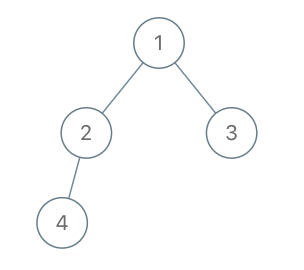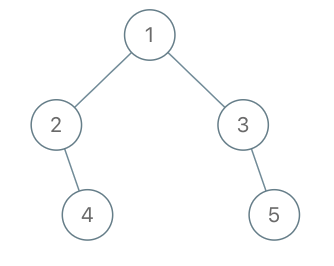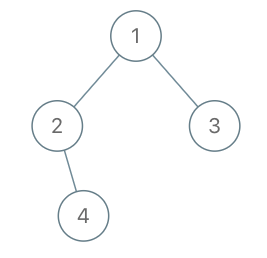Welcome to Subscribe On Youtube
993. Cousins in Binary Tree
Description
Given the root of a binary tree with unique values and the values of two different nodes of the tree x and y, return true if the nodes corresponding to the values x and y in the tree are cousins, or false otherwise.
Two nodes of a binary tree are cousins if they have the same depth with different parents.
Note that in a binary tree, the root node is at the depth 0, and children of each depth k node are at the depth k + 1.
Example 1:

Input: root = [1,2,3,4], x = 4, y = 3 Output: false
Example 2:

Input: root = [1,2,3,null,4,null,5], x = 5, y = 4 Output: true
Example 3:

Input: root = [1,2,3,null,4], x = 2, y = 3 Output: false
Constraints:
- The number of nodes in the tree is in the range
[2, 100]. 1 <= Node.val <= 100- Each node has a unique value.
x != yxandyare exist in the tree.
Solutions
BFS or DFS.
-
/** * Definition for a binary tree node. * public class TreeNode { * int val; * TreeNode left; * TreeNode right; * TreeNode() {} * TreeNode(int val) { this.val = val; } * TreeNode(int val, TreeNode left, TreeNode right) { * this.val = val; * this.left = left; * this.right = right; * } * } */ class Solution { private int x, y; private TreeNode p1, p2; private int d1, d2; public boolean isCousins(TreeNode root, int x, int y) { this.x = x; this.y = y; dfs(root, null, 0); return p1 != p2 && d1 == d2; } private void dfs(TreeNode root, TreeNode p, int d) { if (root == null) { return; } if (root.val == x) { p1 = p; d1 = d; } if (root.val == y) { p2 = p; d2 = d; } dfs(root.left, root, d + 1); dfs(root.right, root, d + 1); } } -
/** * Definition for a binary tree node. * struct TreeNode { * int val; * TreeNode *left; * TreeNode *right; * TreeNode() : val(0), left(nullptr), right(nullptr) {} * TreeNode(int x) : val(x), left(nullptr), right(nullptr) {} * TreeNode(int x, TreeNode *left, TreeNode *right) : val(x), left(left), right(right) {} * }; */ class Solution { public: bool isCousins(TreeNode* root, int x, int y) { TreeNode *p1, *p2; int d1, d2; function<void(TreeNode*, TreeNode*, int)> dfs = [&](TreeNode* root, TreeNode* fa, int d) { if (!root) { return; } if (root->val == x) { p1 = fa; d1 = d; } if (root->val == y) { p2 = fa; d2 = d; } dfs(root->left, root, d + 1); dfs(root->right, root, d + 1); }; dfs(root, nullptr, 0); return p1 != p2 && d1 == d2; } }; -
# Definition for a binary tree node. # class TreeNode: # def __init__(self, val=0, left=None, right=None): # self.val = val # self.left = left # self.right = right class Solution: def isCousins(self, root: Optional[TreeNode], x: int, y: int) -> bool: def dfs(root, fa, d): if root is None: return if root.val == x: t[0] = (fa, d) if root.val == y: t[1] = (fa, d) dfs(root.left, root, d + 1) dfs(root.right, root, d + 1) t = [None, None] dfs(root, None, 0) return t[0][0] != t[1][0] and t[0][1] == t[1][1] -
/** * Definition for a binary tree node. * type TreeNode struct { * Val int * Left *TreeNode * Right *TreeNode * } */ func isCousins(root *TreeNode, x int, y int) bool { var p1, p2 *TreeNode var d1, d2 int var dfs func(*TreeNode, *TreeNode, int) dfs = func(root *TreeNode, fa *TreeNode, d int) { if root == nil { return } if root.Val == x { p1, d1 = fa, d } if root.Val == y { p2, d2 = fa, d } dfs(root.Left, root, d+1) dfs(root.Right, root, d+1) } dfs(root, nil, 0) return p1 != p2 && d1 == d2 } -
/** * Definition for a binary tree node. * class TreeNode { * val: number * left: TreeNode | null * right: TreeNode | null * constructor(val?: number, left?: TreeNode | null, right?: TreeNode | null) { * this.val = (val===undefined ? 0 : val) * this.left = (left===undefined ? null : left) * this.right = (right===undefined ? null : right) * } * } */ function isCousins(root: TreeNode | null, x: number, y: number): boolean { let [d1, d2] = [0, 0]; let [p1, p2] = [null, null]; const q: [TreeNode, TreeNode][] = [[root, null]]; for (let depth = 0; q.length > 0; ++depth) { const t: [TreeNode, TreeNode][] = []; for (const [node, parent] of q) { if (node.val === x) { [d1, p1] = [depth, parent]; } else if (node.val === y) { [d2, p2] = [depth, parent]; } if (node.left) { t.push([node.left, node]); } if (node.right) { t.push([node.right, node]); } } q.splice(0, q.length, ...t); } return d1 === d2 && p1 !== p2; }